by Claire Chambers
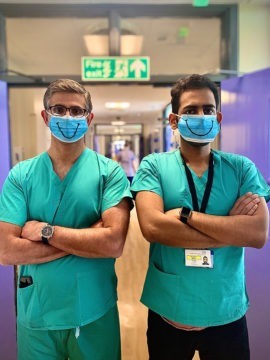
This has been a terrible year with almost no redeeming features. I have written elsewhere about Covid-19’s hardships, both personal and political. Today, with a vaccine on the horizon and Trump defeated, I want to find some other crumbs of comfort that, as with Hansel and Gretel, might take us somewhere.
I am privileged to live with my husband Rob and two sons in our own house with a garden, and to hold down a lecturing job which is pretty secure. Rob is even more financially stable in his career, working as he does in a growth industry this pestilent year: he’s a family doctor.
But of course being a GP has brought its own share of unexpected stresses recently. In March when the UK government spectacularly failed to get PPE for medical professionals and disaster capitalists were circling, Rob bought some pyjamas from Marks and Spencer for turning into improvised surgical scrubs. He even fashioned his own visor using a piece of sponge, some plexiglass, and a coat hanger. Although he never had to use it, I won’t forget that time of helpless, abandoned terror.
Nigerian-American author Chimamanda Ngozi Adichie posted a microblog to Instagram early into this crisis about her fears around the pandemic. When I read these terse words, I nodded vigorously:
My husband is a doctor and each morning when he leaves for work, I worry. My throat itches and I worry. On Facetime I watch my elderly parents. I admonish them gently: Don’t let people come to the house. Don’t read the rubbish news on WhatsApp.
Out of the two vulnerable parents Adichie was worrying about in this essay from April, it is poignant to realize that her father was to die just two months later.
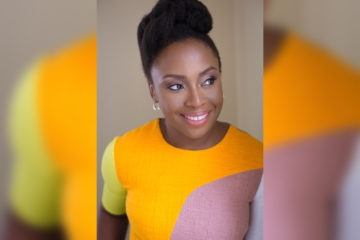
The author wrote about this loss in a powerful essay for the New Yorker entitled ‘Notes on Grief’. Moreover, in July she slipped and fell while playing with her small daughter, ending up alone in a Covid-ravaged Baltimore hospital to be treated for concussion. Adichie is a successful and famous novelist, but as her peer Zadie Smith observes in Intimations, a collection of essays about 2020, ‘it is possible to penetrate the bubble of privilege and even pop it – whereas the suffering bubble is impermeable.’ Every family has its memories of suffering from this year, but Adichie has had it harder than many.
By comparison my lockdown has been easy. I had a very minor brush with precarity once lockdown started and the gyms had to close, when I was furloughed (which at my age spelt fired) from my side-hustle as a Zumba instructor. I wrote about my passion for Zumba in these pages a few years ago. However, the pushiness with which ZIN tried to get me to continue with my membership subscription despite #TheseTryingTimes made it seem to me as though I was being peddled a pyramid scheme rather than the joyful form of exercise I had known. A bad taste in my mouth, I decided to put my decade-long love affair with Latin dance fitness behind me. Hanif Kureishi says, ‘Every 10 years you become someone else’. It was time to move on.
Even in those dark days of spring, Brits were allowed to go out for exercise once per day. I interpreted this as an edict rather than optional. But I found myself at a loss without Reggaeton, fellow dancers, and an airy studio. Change had been forced upon me, and walking and running weren’t quite cutting it. Like so many, I was grappling with feelings of anxiety and dread, but hoped if I could get into a sporty groove my mental health would improve.
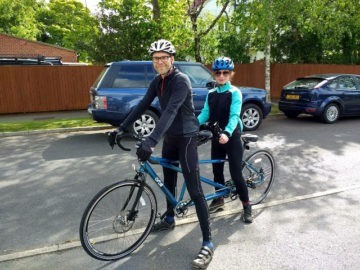 Call me Daisy, but that’s when we hit on the idea of getting a bicycle made for two.
Call me Daisy, but that’s when we hit on the idea of getting a bicycle made for two.
I can’t ride a bike, not really, my sedentary parents having believed they’d done their duty by helping me to graduate from a tricycle and then from stabilizers as a kid, but not much further. This means if you pop me on a bike and get it going, I can travel slowly in a straight line on the flat. Downhills, corners, and stopping are scarier. Such fears were not helped by the couple of wipeouts I had had on those rare occasions as an adult when I’d been persuaded onto a bike.
Rob has always ridden: first his Chopper as a mode of transport when he was too young to drive, and next plenty of mountain biking in the 1990s. Then, as this millennium unfolded, he became a MAMIL – a middle-aged man in lycra – and I called him the Pied Piper of Cycling as he enticed one friend after another to join him on road bike missions. He had tried repeatedly to school me in his cycology too, hence my falls. I was unteachable, unreachable. In the end, we agreed to disagree on this subject. I remained resolutely anti-bike.
My novice status was actually an advantage when we bought what we called the random tandem to help us get through lockdown. Whenever we went out on it, I had precisely zero opinions about gears, braking, or the parabolas we traced around corners. Couple friends would say things like, ‘I hope you get enough turns on the front, Claire.’ But that was the last thing I wanted. Though I was nervous at first, he is a supremely skilled rider, and I trust him. We argue about ninety-nine problems, but the bike ain’t one.
In a way, riding a two-person bike is a metaphor for marriage. You have to know one another well and stay in tune with the other’s movements and reactions. No wonder ‘working in tandem’ is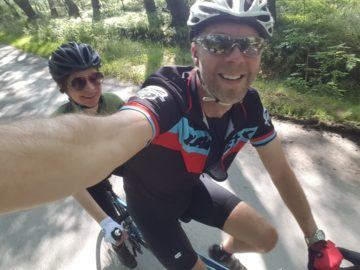 a synonym for harmonious co-existence. That said, after a brief spell of good behaviour as he lured me into his realm, Rob took to barking at me to put some effort in on the steeper hills. ‘The honeymoon’s over,’ he said, darkly.
a synonym for harmonious co-existence. That said, after a brief spell of good behaviour as he lured me into his realm, Rob took to barking at me to put some effort in on the steeper hills. ‘The honeymoon’s over,’ he said, darkly.
Because Rob makes all the decisions about gears and steering while I am completely passive and just pedal, this frees me up to multitask. At least half of the hours we spend in the saddle, I am happily listening to audiobooks from the rear. I discovered audiobooks before lockdown, but became really enthused by the form as an immersive, in some ways heightened, close reading experience after ‘the global shit hit the fan’ (to redeploy Zadie Smith’s maxim). I am delighted to realize I can read and do exercise at the same time. As pilot, Rob is less than delighted to realize his stoker mostly ignores him.
As the terminology of pilot and stoker suggests, there are elements of heteronormativity and male chauvinism in the world of tandems. These vehicles are designed with a straight couple in mind: the stronger, more adept man at the front with the little woman loyally providing the back-up. Still unusual on the road, the appearance of a family bicycle provokes what we have come to know as ‘tandem love’. Fellow cyclists (mostly men) seem quizzical or slightly pleased to see this particular two-wheeler. They sense they should say something – anything – to mark the moment. This often translates into predictably sexist reactions. Rob reports being repeatedly told, ‘She’s not pedalling, mate!’ Headphones in, I’m oblivious as I concentrate on Maggie Gyllenhaal’s peerless reading of Sylvia Plath’s The Bell Jar.
In the starter phase of our tandemic, the more I didn’t fall off, the more I gained confidence. Once we were sure cycling wasn’t just a passing whim, I allowed myself to buy some stylish jerseys and bib tights, beginning to enjoy myself as I discovered peloton chic.
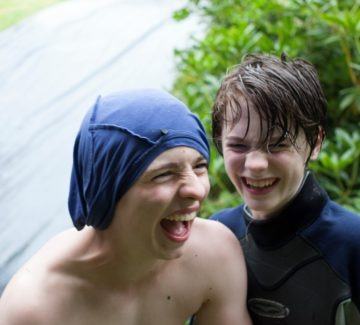 I had been alone with our teenage boys for an unnatural amount of time while Rob carried on working away from home ‘like normal’ and the school’s doors stayed firmly shut. ‘I’m on my gap year,’ declared our thirteen-year-old son amid the euphoria of an unexpected holiday – before boredom and mild depression set in. Far from experiencing the adventures of a year off, my own world had shrunk. It is curious to note that in our separate homes, my father (suffering from early-stage prostate cancer) and I both developed something of a siege mentality, cowering inside and buying more food than we needed in our weekly online grocery hauls.
I had been alone with our teenage boys for an unnatural amount of time while Rob carried on working away from home ‘like normal’ and the school’s doors stayed firmly shut. ‘I’m on my gap year,’ declared our thirteen-year-old son amid the euphoria of an unexpected holiday – before boredom and mild depression set in. Far from experiencing the adventures of a year off, my own world had shrunk. It is curious to note that in our separate homes, my father (suffering from early-stage prostate cancer) and I both developed something of a siege mentality, cowering inside and buying more food than we needed in our weekly online grocery hauls.
Even when the schools re-opened, our elder son having been handed his GCSEs in August with no exams and just teacher assessments, it was a hokey-cokey first term back. Each boy had to go off at least once for fortnight-long self-isolation periods after sitting near kids who later tested positive for coronavirus. Then the virus ripped through our elder son’s ‘squad’, with at least three of his friends catching it. I don’t know how he didn’t come down with it too, as he shared a water bottle at the gym with one of them, the Covidiot. One of the mums, who has an underlying health problems, had it viciously and was in and out of hospital with a pulmonary embolism. Really frightening, but everyone seems more or less better a month on.
I knew I was lucky that only our younger son had had the virus back in March, and that too a mild case (at least, we think so – this was before ordinary people were able to get tested). But I couldn’t help finding the newfound dearth of time to myself hard. On a couple of occasions when I couldn’t take the quaranteens any more, I went with Rob to his doctor’s surgery for a brief escape. There was a separate building, the ‘clean site’, which they kept Covid-free and where I could work. I would become remarkably excited about going to a dreary, windowless room for a half-day; how my lifestyle standards had slipped. Even still, I was restless and missed being able to travel abroad.
At least now at weekends, I could extract myself from lockdown claustrophobia on the tandem. I’d been so long stuck in the house that my driving was rusty and I felt nervous behind the wheel. Getting out on 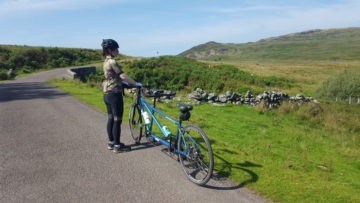 our new contraption instead and seeing the world again made me think of a line from Tabish Khair’s novel Just Another Jihadi Jane: ‘I heard the cry of birds – oh well, it was a crow, but even a crow’s croaking sounded wonderful. There still was life.’ It was exhilarating to discover, away from the safety of home, not the feared zombie apocalypse but quiet(ish) nature.
our new contraption instead and seeing the world again made me think of a line from Tabish Khair’s novel Just Another Jihadi Jane: ‘I heard the cry of birds – oh well, it was a crow, but even a crow’s croaking sounded wonderful. There still was life.’ It was exhilarating to discover, away from the safety of home, not the feared zombie apocalypse but quiet(ish) nature.
Talking of the bird’s cry and the crow’s croaking, Rob and I have the benediction of living in Yorkshire, God’s own country. What this signifies is hills, which Rob describes with customary understatement as not insignificant undulations. We spy a fox vanishing into a hedgerow and double-take at a peacock in someone’s garden. We swish past drystone walls and barns, limestone scarring and pavement at Malham, dark cobbles in the Brontës’ Haworth, roiling river the Strid near Bolton Abbey, and the Yorkshire grit of Brimham Rocks. Tea rooms are tantalizingly near, but for much of the period they are closed or only serving takeaway, obeying the latest government decree. During the brief interregnum of ‘Eat Out to Help Out’ in high summer, we have libations at an outdoor pub near Harrogate on one memorable ride. Given this stunning backdrop, it is easy to see why road cycling has become such a phenomenon in Yorkshire.
 In 2014, Tabish – whose wonderful novel Just Another Jihadi Jane I just quoted – had invited me to attend a party he and his wife were holding in Cambridge one Saturday that July. At this soiree, some of the great and the good of postcolonial literature were on the guest list. I was ablaze with excitement, immediately launching into a search for the best Cambridge college to stay in and the right dress to wear. However, when I spoke to Rob he reminded me it was the Grand Départ of the Tour de France in Yorkshire that weekend. This was disastrous, for it was likely to be tricky coming into or leaving Leeds during those two days. What’s more, cycling fanatic Rob had planned a profusion of activities, as well as inviting relatives to stay with us to watch the race. He was sorry and I was disappointed, especially because as you know I could hardly care less about cycling at the time. A compromise was reached when I decided to make a trip down to see Tabish and family in Cambridge on the Monday after the Grand Départ and the party. Imagine my surprise when I disembarked from my train at the end of the long journey through the fens, and found huge crowds, a police presence, and traffic diversions. No one had told me that the next stage of the Tour de France that year was from the dreaming spires to London. These elite road lice were following me around!
In 2014, Tabish – whose wonderful novel Just Another Jihadi Jane I just quoted – had invited me to attend a party he and his wife were holding in Cambridge one Saturday that July. At this soiree, some of the great and the good of postcolonial literature were on the guest list. I was ablaze with excitement, immediately launching into a search for the best Cambridge college to stay in and the right dress to wear. However, when I spoke to Rob he reminded me it was the Grand Départ of the Tour de France in Yorkshire that weekend. This was disastrous, for it was likely to be tricky coming into or leaving Leeds during those two days. What’s more, cycling fanatic Rob had planned a profusion of activities, as well as inviting relatives to stay with us to watch the race. He was sorry and I was disappointed, especially because as you know I could hardly care less about cycling at the time. A compromise was reached when I decided to make a trip down to see Tabish and family in Cambridge on the Monday after the Grand Départ and the party. Imagine my surprise when I disembarked from my train at the end of the long journey through the fens, and found huge crowds, a police presence, and traffic diversions. No one had told me that the next stage of the Tour de France that year was from the dreaming spires to London. These elite road lice were following me around!
From that year until the plague hiatus in 2020, the Tour de Yorkshire has become an annual fiesta, and Rob has got more and more into watching the race and other grand tours on television. I don’t follow the tactical exploits or find it at all interesting. Occasionally, though, when I feel tired and overworked, I sit with him and go into a fugue state of companionship and boredom in front of the TV. With the diminished crowds, mask-wearing athletes, and socially-distant anchors, this year the sport has been eerily different and quite moving, as Gary Naylor discusses beautifully for the Guardian.
I asked Rob for a word or two about what the tandem has done for him mentally and emotionally, but he took that rather literally and so I didn’t get much insight. He prefaced his thoughts with, ‘I thought you said no one would read this blog? Just make it up.’ Then he implied that it was reassuring in this year of limited contact outside one’s bubble to have a willing rider at home for if he couldn’t go out with friends. We agreed we’d never thought the day would come when we would cycle together, and that it’s great to have this to do together. His take on what it’s like riding with me when he’s been a solo rider all his life is that it works well because I don’t express views about his decision-making. And I’ve even got him into reading audiobooks, if not as much as me. Prone to melancholy, he does perceive tandem cycling as having a positive effect on his state of mind during the pandemic.
One day in early autumn, Rob and I went for a bike ride in the Dales in some glorious weather. On the way back our tandem fell off the newly-bought car roof carrier, bounced off a grass verge and 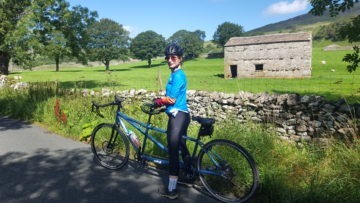 into the road. We were extremely lucky it didn’t hit another car (or even a person, yikes), and the damage was minimal. It shocked us both and taught us a lesson about securing the bike more tightly to the roof. It also made us reflect on how it’d be hard to survive without the bike now, even though it’s still a new purchase in our eyes.
into the road. We were extremely lucky it didn’t hit another car (or even a person, yikes), and the damage was minimal. It shocked us both and taught us a lesson about securing the bike more tightly to the roof. It also made us reflect on how it’d be hard to survive without the bike now, even though it’s still a new purchase in our eyes.
Where have all these crumbs led us, and should I conclude by presenting this tandemic year as a gingerbread cottage or a wicked witch? Both, I would argue.
In his bad take on Covid-19 Ce virus qui rend fou (translated as The Virus in the Age of Madness), French philosopher Bernard-Henri Levy categorically states that it is ‘obscene’ to see any opportunity or the chance for a reset in this cataclysm. Reactionary as ever, in this book he expresses his desperation to get back as quickly as possible to the way things were before the pandemic. No doubt he would condemn as militant or sentimental writers of colour like Arundhati Roy, who calls for the pandemic to be ‘a portal’ to social justice, Elif Shafak, who positions it as a crossroads moment for humanity, or Amartya Sen, who surmises that, as with the post-Second World War rise of the welfare state, ‘a better society can emerge from the lockdowns’. Despite their hopes for a better future out of the ashes, none of these thinkers is naive or plays down the untimely deaths, economic devastation, and social suffering SARS-CoV-2 has brought in its wake.
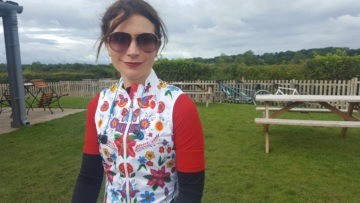 Optimism, as Lauren Berlant reminds us, can be cruel when there clearly is no hope. But what about situations like this pandemic where the waters are muddier? In a widely circulated essay ‘Your Surge Capacity is Depleted – It’s Why You Feel Awful’, Tara Haelle evokes the productiveness of ‘both-and’ rather than either-or thinking when confronted with uncertainty like Covid-19. She writes, with reference to therapist and social scientist Pauline Boss’s influential theory of ambiguous loss:
Optimism, as Lauren Berlant reminds us, can be cruel when there clearly is no hope. But what about situations like this pandemic where the waters are muddier? In a widely circulated essay ‘Your Surge Capacity is Depleted – It’s Why You Feel Awful’, Tara Haelle evokes the productiveness of ‘both-and’ rather than either-or thinking when confronted with uncertainty like Covid-19. She writes, with reference to therapist and social scientist Pauline Boss’s influential theory of ambiguous loss:
For the families of soldiers missing in action in Vietnam that Boss studied early in her career, or the family members of victims of plane crashes where the bodies aren’t recovered, this type of thinking means thinking: “He is both living and maybe not. She is probably dead but maybe not.”
“If you stay in the rational when nothing else is rational, like right now, then you’ll just stress yourself more,” she says. “What I say with ambiguous loss is the situation is crazy, not the person. The situation is pathological, not the person.”
An analogous approach during the pandemic might be, “This is terrible and many people are dying, and this is also a time for our families to come closer together,” Boss says. On a more
personal level, “I’m highly competent, and right now I’m flowing with the tide day-to-day.”
Both-and thinking is a pluralistic way of holding together pessimism (realism?) with hope, the rational with the numinous. It is okay, then, for me to say that I joined the tandem fandom, was transported (in both connotations of the word) by cycling, and felt closer to my family because of this new hobby. I also see 2020 as an unmitigated disaster. Both of these things can be true.
In Pandemic! COVID-19 Shakes the World, Slavoj Žižek asks, ‘Is not the miracle of love that you are part of my identity precisely insofar as you remain a miracle that I cannot grasp, a riddle not only for me but also for yourself?’ All these years Rob’s cycling life was a miracle I could not grasp. Now, in the middle of our tandemic, I come close to solving the riddle.
